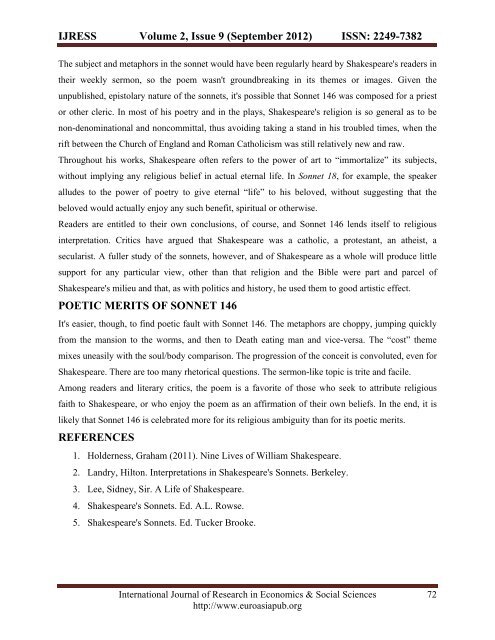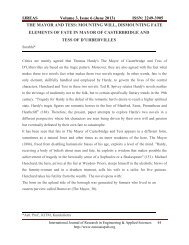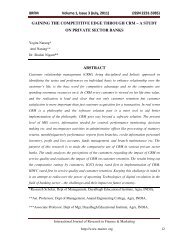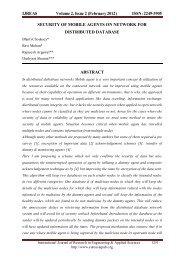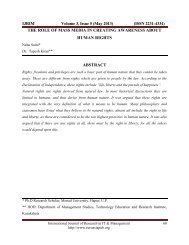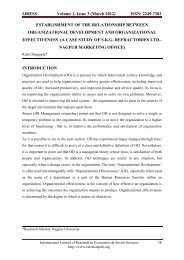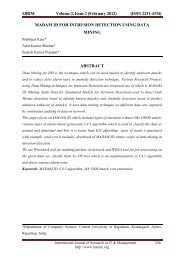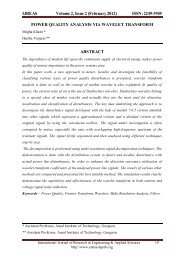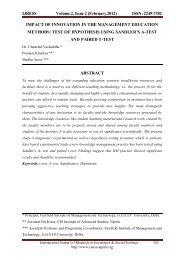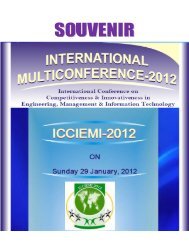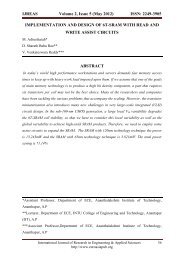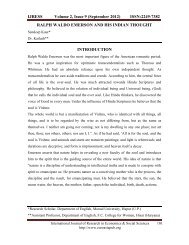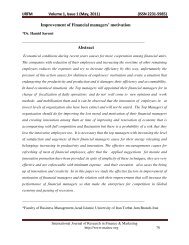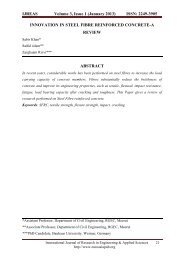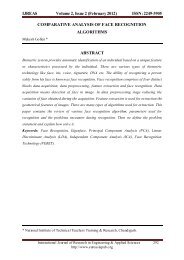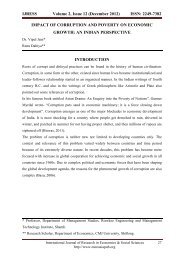shakespeare's sonnets - a critical analysis - Euroasiapub.org
shakespeare's sonnets - a critical analysis - Euroasiapub.org
shakespeare's sonnets - a critical analysis - Euroasiapub.org
Create successful ePaper yourself
Turn your PDF publications into a flip-book with our unique Google optimized e-Paper software.
IJRESS Volume 2, Issue 9 (September 2012) ISSN: 2249-7382<br />
The subject and metaphors in the sonnet would have been regularly heard by Shakespeare's readers in<br />
their weekly sermon, so the poem wasn't groundbreaking in its themes or images. Given the<br />
unpublished, epistolary nature of the <strong>sonnets</strong>, it's possible that Sonnet 146 was composed for a priest<br />
or other cleric. In most of his poetry and in the plays, Shakespeare's religion is so general as to be<br />
non-denominational and noncommittal, thus avoiding taking a stand in his troubled times, when the<br />
rift between the Church of England and Roman Catholicism was still relatively new and raw.<br />
Throughout his works, Shakespeare often refers to the power of art to “immortalize” its subjects,<br />
without implying any religious belief in actual eternal life. In Sonnet 18, for example, the speaker<br />
alludes to the power of poetry to give eternal “life” to his beloved, without suggesting that the<br />
beloved would actually enjoy any such benefit, spiritual or otherwise.<br />
Readers are entitled to their own conclusions, of course, and Sonnet 146 lends itself to religious<br />
interpretation. Critics have argued that Shakespeare was a catholic, a protestant, an atheist, a<br />
secularist. A fuller study of the <strong>sonnets</strong>, however, and of Shakespeare as a whole will produce little<br />
support for any particular view, other than that religion and the Bible were part and parcel of<br />
Shakespeare's milieu and that, as with politics and history, he used them to good artistic effect.<br />
POETIC MERITS OF SONNET 146<br />
It's easier, though, to find poetic fault with Sonnet 146. The metaphors are choppy, jumping quickly<br />
from the mansion to the worms, and then to Death eating man and vice-versa. The “cost” theme<br />
mixes uneasily with the soul/body comparison. The progression of the conceit is convoluted, even for<br />
Shakespeare. There are too many rhetorical questions. The sermon-like topic is trite and facile.<br />
Among readers and literary critics, the poem is a favorite of those who seek to attribute religious<br />
faith to Shakespeare, or who enjoy the poem as an affirmation of their own beliefs. In the end, it is<br />
likely that Sonnet 146 is celebrated more for its religious ambiguity than for its poetic merits.<br />
REFERENCES<br />
1. Holderness, Graham (2011). Nine Lives of William Shakespeare.<br />
2. Landry, Hilton. Interpretations in Shakespeare's Sonnets. Berkeley.<br />
3. Lee, Sidney, Sir. A Life of Shakespeare.<br />
4. Shakespeare's Sonnets. Ed. A.L. Rowse.<br />
5. Shakespeare's Sonnets. Ed. Tucker Brooke.<br />
International Journal of Research in Economics & Social Sciences 72<br />
http://www.euroasiapub.<strong>org</strong>


